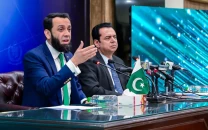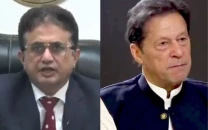'Degrees copying MBBS titles promote quackery'
Healthcare regulators say qualifications misused by individuals impersonating medical graduates

The Joint Healthcare Regulators Forum (JHCRF) on Friday urged the Higher Education Commission (HEC) to immediately shut down or rename degree programmes whose titles resemble MBBS, warning that such qualifications are being misused by individuals impersonating medical graduates and contributing to the widespread problem of quackery in the country.
For example, Bachelor of Science in Medical Laboratory Technology (BSMLT) and Bachelor of Science in Medical Imaging Technology (BSMIT) may lead people to consider the graduate as a physician doctor.
The recommendation came during the third JHCRF meeting, convened by the Sindh Healthcare Commission (SHCC) in collaboration with the Ministry of National Health Services, Regulations and Coordination (MNHSR&C) and the World Health Organization (WHO). The forum drew together senior officials from federal and provincial regulatory bodies to review healthcare governance challenges.
A communiqué issued after the meeting stated that degree titles misleadingly similar to MBBS were enabling graduates of unrelated programmes to present themselves as medical doctors-posing a direct threat to patient safety. Participants urged HEC to intervene by renaming or discontinuing such programmes and enforcing stricter accreditation protocols.
MPA Nida Khuhro, Parliamentary Secretary for Health and Population Welfare, Sindh, attended the session as chief guest. Addressing the forum, she said Sindh had built a "strong regulatory system" over years of reform and legislation, and was now positioning itself for the next phase: digitising healthcare oversight.
"With fast-changing technology, Sindh aims to create a comprehensive digital health framework covering telemedicine, e-prescriptions and online pharmacies so that patient safety remains uncompromised," she said.
Khuhro praised the SHCC for its work in the private sector, noting that regulatory gaps in public systems were being addressed through coordinated interventions. She announced that Sindh was establishing a Clinical Governance Academy to train healthcare workers in quality assurance, risk management and evidence-based policy.
"Sindh is also expanding its system to ensure that medicines and medical devices meet global standards, including minimum safety requirements, infection control protocols and emergency governance," she added. Mandatory Continuing Professional Development (CPD) requirements for healthcare professionals, she said, were being fully aligned with international norms.
WHO Representative in Pakistan, Dr Luo Dapeng, reaffirmed the organisation's support for strengthening regulatory coherence across the country's fragmented health sector. "This platform reflects a shared commitment to improving accountability and enhancing the resilience of Pakistan's health system," he said.
Joining the meeting via video link, Federal Secretary MNHSR&C Hamed Yaqoob Sheikh highlighted policy reforms undertaken by the ministry, including the introduction of the National Blood Transfusion Policy and a new policy framework for Thalassaemia Prevention and Genetic Disorders. He urged provincial and institutional regulators to ensure swift implementation.
Dr Ahson Qavi Siddiqi, CEO SHCC, said the past several decades had transformed healthcare dramatically, introducing new technologies and treatments not yet covered under existing regulations. This regulatory gap, he said, required urgent harmonisation across provinces-one of the core objectives of the JHCRF platform.
He reiterated the forum's demand that HEC act against degree programmes that imitate MBBS nomenclature and contribute to quackery.
SHCC Chairperson Dr Khalid Shaikh, in his concluding remarks, said the attendance of top regulatory officials from across the country demonstrated a shared national vision and institutional commitment. "Today's meeting underscored the urgent need for collective action. Issues such as patient safety, implementation of standards, curriculum reforms and the menace of quackery cannot be tackled in isolation," he said.




















COMMENTS
Comments are moderated and generally will be posted if they are on-topic and not abusive.
For more information, please see our Comments FAQ